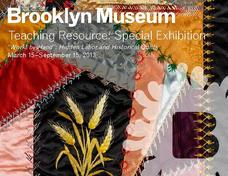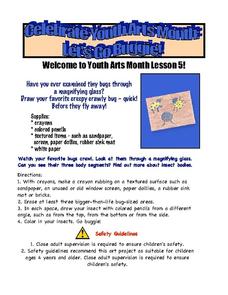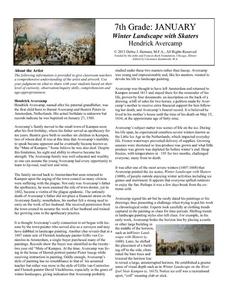Brooklyn Museum
"Workt by Hand": Hidden Labor and Historical Quilts
Just like a painting or the symbols on a flag, quilts can express ideas that reflect a cultural context, space, and time. The class discusses the history of quilt making throughout US history and what different types of quilts mean. They...
Arts & Humanities
Let's Go Buggie!
To celebrate art youth month, little ones get out the magnifying glasses and get close-up with bugs. They make scientific observations of bugs you bring into the classroom. Then, they use markers, clay, paint, or crayons to make artistic...
Concordia University Chicago
Winter Landscape with Skaters by Hendrick Avercamp
In need of a quick set of ideas to use on a wintery day? Why not analyze Winter Landscape with Skaters with your class? After a thorough discussion, learners compare and contrast two paintings, research what curators do, draw landscapes,...
Debra J. Herman
The Blue Room by Susanne Valadon
Nearly anything can inspire art. Analyze The Blue Room by Susanne Valadon to help your learners understand that art is everywhere. They'll discuss the line, shape, color, and mood of the piece while attempting to better grasp its...
Kids Discover
Ancient Egypt by KIDS DISCOVER
Discover Ancient Egypt! Learn about mummification and gods, visit pyramids and temples, examine cliff carvings and paintings, take quizzes and engage in activities. Colorful, interactive, and easy to use, this app is not just for kids!
Scholastic
Study Jams! Area of Irregular Figures
Painting an irregular figure can be tricky if we don't know the exact area. This interactive presentation reveals that irregular figures can be broken into smaller, simple figures that use the area formulas. Go through two examples,...
Khan Academy
Challenge: Picture Painter
Your young coding students will love the result of this programming activity and will be amazed at what they can make the computer do. Using objects and their properties, they will create a paint brush that will redraw an object across...
Google
Design and Budget Your Own Dream Room
What middle schooler wouldn't want to design their own dream room? This project walks them systematically through the steps of calculating wall area, purchasing paint and carpet, designing a ceiling pattern, hanging shelves for storage,...
National Gallery of Canada
Reading Symbols
Introduce your upper-elementary students to printmaking. Class members view prints, select and research symbols in a piece, and create their own sets of prints using styrofoam trays. Pupils can wash off the paint on their trays to make...
National Gallery of Canada
My First Print
Practice printmaking with a fun activity. After observing images, class members use the listed materials, such as stamps and sponges, create their own prints. They experiment with layering, pressure, and paint colors.
National Gallery of Canada
Urban Scenes
Select a theme together to guide and inspire works of art. Class members view images of art and discuss the images of cities. After choosing a theme, individuals create posters that reflect and contribute to the theme. They can use paint...
Huntington Library
Everyday Life - Exploring the California Missions
Young scholars relive history as they examine primary sources that document everyday life in the California missions. During a class viewing of the included slideshow presentation, children analyze documents, paintings, and...
Armory Center for the Arts
Place Value Collage
How can art represent math? Use a lesson on place value collages to illustrate the different meanings that numbers have in their designated places. Kids observe photographs and paintings that show place value, then work on their own.
K12 Reader
Two Viewpoints of the Same Event: Lee Surrenders to Grant, 1865
How did Union General Ulysses S. Grant view the surrender of Confederate General Robert E. Lee in 1865, which effectively ended the United States Civil War? After reading an excerpt from Grant's autobiography, your young historians will...
MENSA Education & Research Foundation
Shapes - Kindergarten
Extend scholars' learning experience with a unit consisting of five shape lesson plans, an extension activity, assessment, and rubric. Begin by reading a story about shapes, then conduct an overview and assign pupils' their first...
Polk Bros Foundation
American Presidents
Emanuel Leutze's painting Washington Crossing the Delaware. Alexander Gardner's photograph of Abraham Lincoln. What do these works of art tell us about the character of these American Presidents? After examining the techniques the...
Alabama Learning Exchange
Edgar Allan Poe's Journey Through Life and Literature
How was Edgar Allan Poe able to create "intriguing, memorable, and lasting literature"? To answer this question, learners analyze the syntax, diction, and characterizations in Poe's poems and short stories and compare the impact of these...
Read Works
Fireflies in the Garden
Imagine a dark sky lit up with fireflies. Robert Frost's "Fireflies in the Garden" instills a visual in the reader's mind of a star lit sky glowing with fireflies. After reading the poem, learners compare and contrast the image the...
CK-12 Foundation
Quadratic Functions and Equations
The form of a quadratic function paints a picture of its graph. Young mathematicians explore this connection by locating key features on a graph and then writing the corresponding equations. The interactive tutorial highlights key...
CK-12 Foundation
Rose Colored Glasses
How can we change the color of what we are seeing? The simulation allows individuals to change the color of a car's paint, the color of light pointed at the car, and the color of glasses the person is wearing. Each combination creates a...
University of Minnesota
Beautiful Brain: Do You See What I See?
Can art play tricks on your eyes, and can a still painting really appear to vibrate? The second lesson in a four-part series discusses the way our beautiful brains translate visual images. It highlights the style of optical art and...
PBS
Benjamin Franklin: Writer, Inventor, and Founding Father
Imagine being a writer, inventor, businessman, and the founding father of an entire nation! Pupils analyze the life and activities of Benjamin Franklin. Primary documents, videos, and paintings open up the world of Franklin to young...
PBS
Estimating Profit from a Job
Profit always seems to get everyone's attention. The same is true during a lesson on estimation. Learners use given information to estimate the cost of supplies for a painting job. They then develop a strategy for estimating the...
University of Pennsylvania
Using Comic Strips to Teach Multiple Perspectives
Scholars view comics from two different perspectives; one paints the Alfred Dreyfus as innocent, while the other portrays the exact opposite. They solve the mystery of what happened by analyzing the source, working in groups, and...
Other popular searches
- Renaissance Paintings
- Dot Paintings
- Medieval Paintings
- Tomb Paintings
- Aboriginal Art Dot Paintings
- Bark Paintings
- Sand Paintings
- Aboriginal Dot Paintings
- Fresco Paintings
- Scroll Paintings
- Block Paintings
- Aboriginal Paintings

























